#Regarding Ananke
Explore tagged Tumblr posts
Text
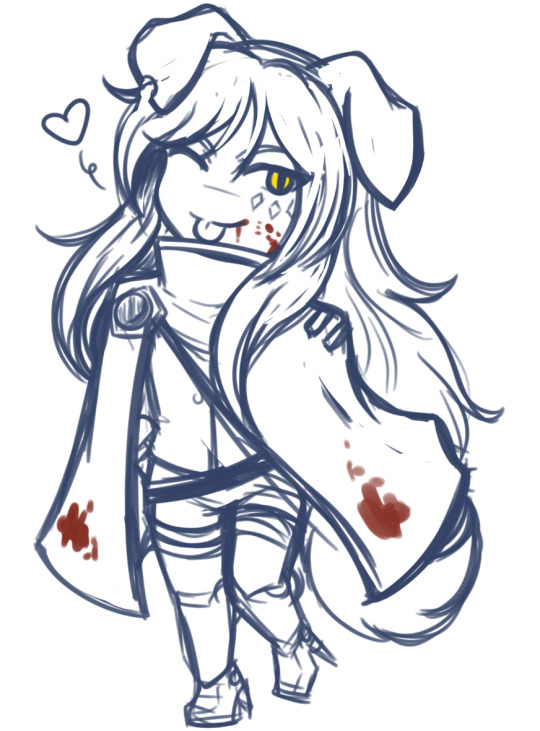
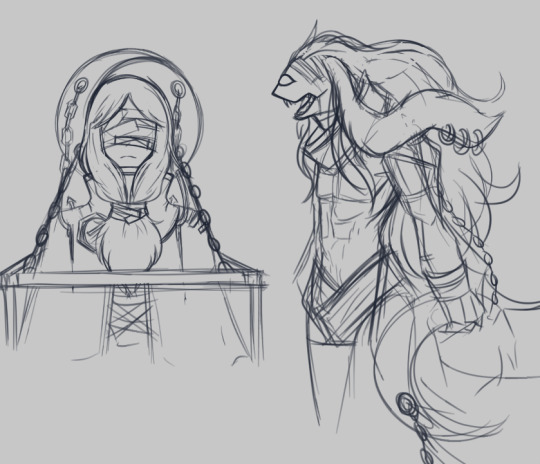
Pubbyyyy--
2 notes
·
View notes
Text
@the-blue-fairie @meadow-mellow
"The romantic plot’s most popular resurrection to date is Luc Plamondon’s musical, Notre-Dame de Paris, which premiered in the Palais des Congrès on September 16, 1998. Staging a rock opera version of Hugo’s monumental novel, the Canadian gave France its biggest “show” of the twentieth century. While little of Hugo’s medieval Paris can be found in Plamondon’s hip hop musical, it is particularly faithful to the nineteenth-century writer’s brilliant use of nostalgia, which Plamondon uses to arouse longing for both a fleeting present and more than five centuries of French history. As the musical’s title song, “Le Temps des cathedrales,” points out, this rewrite’s story falls somewhere between the first millennium and “l’an deux mille,” caught between 1482 and Plamondon’s outlook for the future, of course, is pessimistic as he reminds his French audience that the next millennium will not be the utopia some hope for. As the opening song states:
Il est foutu le temps des cathédrales
La foule des barbares est aux portes de la ville
Laissez entrer ces païens, ces vandales
La fin de ce monde
Est prévue pour l’an deux-mille
Est prévue pour l’an deux-mille
Plamondon’s conclusion on who or what is responsible for “la fin de ce monde” is ambiguous, and must be translated by Claude Frollo, who like the priest in Hugo’s story, is a careful reader and translator. Literally reading the writing that has been spray painted on a set prop made to look like the walls of Notre-Dame, Frollo points out how Plamondon cleverly replaces Hugo’s ANANKE with ANARKHIA. When Gringoire asks him to translate the ancient graffiti, the priest shouts “Tu es un possédé ! Le grec ‘Anarkhia’ veut dire ‘Fatalité.’”
Many have commented on this mistranslation and Plamondon’s rewriting of Hugo, which I believe is a playful palimpsest or literary possession, which warns audiences, by scribbling ANARKHIA over the more famous ANANKÉ, of what is to come – a new millennium that will be ruled by anarchy and chaos. Anarchy obviously inspires the content and context of Plamondon’s musical, especially with regard to time. Characters constantly make anachronistic political and cultural references, dancing around the question of what time they are really in. The musical’s “sans papiers,” who are a strange mix of Gypsies and other outsiders, are the musical’s uncanny reminder of how close the twenty-first century is to Hugo’s nineteenth-century Cour des Miracles. But like Hugo, Plamondon contains this anarchy by the end of the musical, neatly tying up loose ends in the last scenes. By killing Clopin, Plamondon’s king of the G*, and hanging Esmeralda from a scaffold on stage, the Canadian offered his French audiences a solution, one in which the anarchy celebrated by the G*’ songs can be squelched and buried onstage.
As the musical’s script begins to impose itself on anarchy, France can mourn the loss of Clopin and Esmeralda while taking a nostalgic sigh of relief, knowing that some stories will remain the same, even when transported to a new millennium.
Plamondon wasn’t alone in recognizing that Notre-Dame de Paris could be a seductive story for end-of-the-millennium audiences. In the late nineties, three different interpretations of Hugo’s novel made it to the big screen within a period of three years.
Disney released the first adaptation in 1996 with The Hunchback of Notre-Dame, its fifth top-grossing movie to date.
And a year later, the American television network TNT released The Hunchback, starring Richard Harris as Claude Frollo, Mandy Patinkin as Quasimodo and Salma Hayeyk as Esmeralda. Both of these American films have a humanist twist and an optimistic and positive outlook on the future. And in both stories, Esmeralda not only gets her happy ending, but becomes the kind of heroine reminiscent of Sand’s G* characters, as she paves the way for new beginnings."
(Taming the G*: How French Romantics Recaptured a Past)
#elizabeth carter hanrahan#notre dame de paris#the hunchback of notre dame#literature#disney#victor hugo#race and representation#romani#the history side of tumblr
5 notes
·
View notes
Text

Ananke and the Fates.
Ananke the personification of Necessity, above the Moirai, the Fates.
Sun in Virgo II – 1 to 12 Sept. 24
The Sun enters Virgo II, The Hammer and Anvil, (as named by Austin Coppock) on 1 September at 7:25 pm EDT, and remains there until 12 September 2024 at 2:40 am when he enters the third decan of Virgo The Sarcophagus, making ten days, seven hours, and fifteen minutes. T. Susan Chang called this decan, associated with the 9 of pentacles, Perfection Alone.
The Moirai, commonly known as the Fates or by their individual names, were regarded in this season with special honor — Clotho, the spinner of the thread; Lachesis, who measures it; and Atropos who wields the shears to clip it.
From: Wanderings in the Labyrinth Andrew B. Watt's blog
Ananke (Necessity) overlooks the three Moiras.
The term Moira in Greek means portion of, part, and designates the term FATE. 1857
The name Ananké (Greek Ἀνάγκη) means an inescapable necessity, destiny, inevitable fate. She is the goddess of destiny and inevitable fate in Greek mythology. The mother of Moirs and Adrasyth.
"And there were another three who sat round about at equal intervals, each one on her throne, the Moirai (Fates), daughters of Ananke, clad in white vestments with filleted heads, Lakhesis, and Klotho, and Atropos, who sang in unison with the music of the Seirenes, Lakhesis singing the things that were, Klotho the things that are, and Atropos the things that are to be . . . Lakhesis, the maiden daughter of Ananke (Necessity)." - Plato
9 notes
·
View notes
Text
THE WORLD OF PARMENIDES – ESSAYS ON THE PRESOCRATIC ENLIGHTMENT by Karl Popper
On the traces of our thinking - Part One
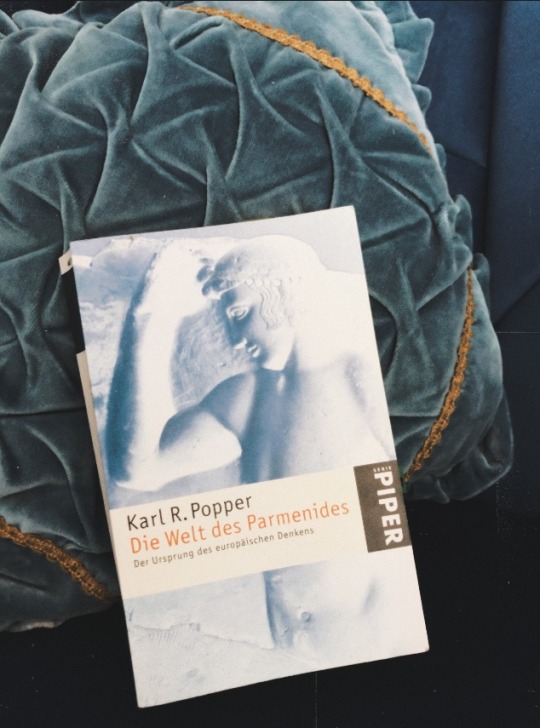
„Bright in the night, with an alien light, Round the Earth she is drifting. Always she wishfully looks Out for the rays of the Sun.”
Philosopher of Science Sir Karl Raimond Popper admired the Presocratic philosophy throughout his lifetime. Popper considers the Presocratic speculations and cosmogony as the beginning of our history of science, especially with regards to epistemology and theoretical physics. It is believed that speculative philosophy began with the Ionians, including Thales of Miletus and his disciple Anaximander. They developed the method of critical approach or critical tradition: To approach an explanatory myth (critical revision of mythical poems such as Homer or Hesiod’s "Theogony") with critical eyes. Even today, the verification of a theory for its truthfulness is a special feature of science. However, one should not underestimate the importance of incorrect theories, which were able to justify the problem and refine the explanation in the first place through falsification, since they can lead to a finer awareness of the problem again through the refutation. With this following book, Popper wants to contribute to a better understanding of the Presocratic. In addition, he wants to illustrate with his explanations the thesis that "history is- or should always be, the history that serves to solve the problem (...)." Popper discusses the basic ideas of the early Greek philosophers and shows the development of a critical methodology with the legacy of the search for truth, illustrated in particular by the didactic poem by Parmenides and the parable of the two paths.

The importance of Presocratic ideas in today's science is found in the reconciliation and unification of contradictory assumptions: Nothing changes (Parmenides) and everything changes (Heraclitus). But how is change possible in the first place and how do we come to knowledge? It is a remarkable intellectual achievement to define different forms of knowledge and to distinguish intellectual thinking from knowledge in general. The revelation of the goddess (Ananke? Dike?) is a journey to the real and deceptive world. An experience of rapture must have distorted Parmenides' reality of life in such a way that he depicted this lightning-like illumination in this dualistic conception. The goddess, who describes the human world as false and deceptive, wants to reveal to Parmenides the secret truth about nature and reality, but also the false opinions of mortal men. As mentioned above, the dualistic concept can also be found in the textual form: The poem is divided into two parts and begins with an introduction (Proömium). The first path is described as the Path of Truth (or the Path of True Knowledge) and the second path as the Path of Human Conjecture (Path of Conjectural Knowledge). The second part has survived only in fragments, the incompleteness is illuminated by Plutarch's reports, whereas the first part caused a sensation and was often quoted and copied. In the first part, "The Path of Truth", the Goddess presents a radically rationalist and anti-sensualist epistemology and then leads to a purely logical proof, culminating in the thesis that there can be no movement and that the world is in truth made up of a motionless, gigantic, homogeneous and massive spherical block where nothing can happen: Neither past nor future. This world stands in sharp contrast to the world of apparitions in part two, The Path of Human Conjecture. This is the world as ordinary mortals experience it, the rich and varied world of movement, change, development, the colourful world of opposites, the world that distinguished night and light. Dualistic-World-Concepts arise from the preoccupation with the question of the first substance, or in this particular case, one assumes a twofold building material (e.g. spirit > < body ; subject > < object).
“Listen! And carry away my message when you have grasped it! Note the only two ways of inquiry that can be thought of: One is the way that it is; and that non-being cannot be being. That is the path of Persuasion, Truth’s handmaid; now the other! The path is that it is not; and that it may not be being. That path- take it from me! – is a path that just cannot be thought of. For you can’t know what is not: It can’t be done; nor can you say it.”
[Character limit :/ ...text continues in the second part]
#Presocratic philosophy#cosmogonic questioning#ontology#epistemology#philosophy#literature#Karl Popper#Popper#philosophy of science#scientific research#history of theories#metaphysics#Parmenides#Heraclitus#substance and being#theories of conscience#eternal truth#ancient philosophy#ancient wisdom#ancient scepticism#knowledge#real knowledge#Entrückungsmoment#Xenophanes#Eleatische Schule#Ionische Schule
3 notes
·
View notes
Text
ok time to yap about ocs n their queerness ig broken into groupings obvi. i have over 300 alternative accounts ocs they aint all catching the spotlight.
anyway. starting w what i lovingly refer to as the bf/maxverse. aka all the ocs i made for one-shots with my boyfriend (ananke doesn't count bc that's expansive. and too many. they scare me)
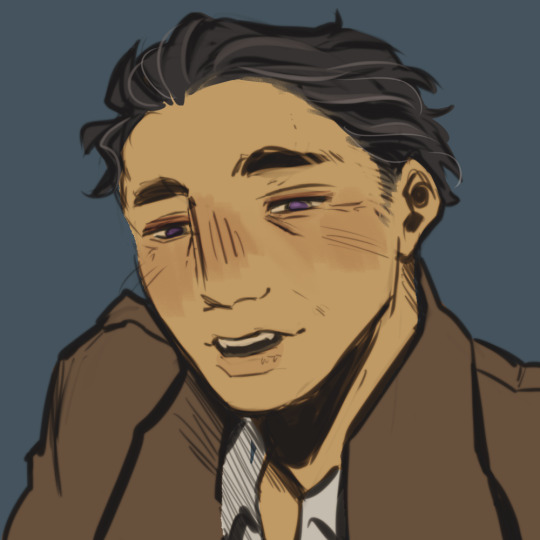
Aydin Wrong (idk man we'll call it freakverse)-- 44 y/o ☆ he/him ☆ gay
Aydin grew up well taken care of and loved so he had very little trouble coming to terms with the fact that he was gay, though it still took him until high school to officially come to a conclusion regarding his sexuality. He likely felt more pressure and shame around his sexual play preferences. He's very comfortable in his homosexuality, but doesn't go out of his way to bring it up in unrelated conversations. Part of this is probably because he thinks it's funny when people thinks he's straight.
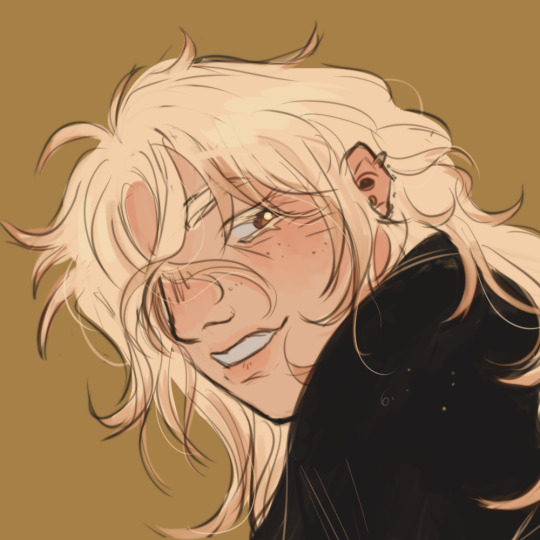
Baldur Solar (Kingdom of Masks) -- 18 y/o ☆ he/they ☆ queer, genderqueer
Baldur's family is strict and doesn't offer a lot of freedom. Because of this, he isn't really "out" I would imagine. He definitely pokes fun at the idea of it and it's CLEAR that there's something queer about them but, especially when it comes to his sexuality, there is absolutely no room to explore it (lore reasons, he's studying to become a doctor and doctors can't have romantic relationships womp womp). Despite this, they don't agonise over it too much and would rather serve underhanded compliments towards the people around them, including their older "brother" (he can sniff them out a mile away).
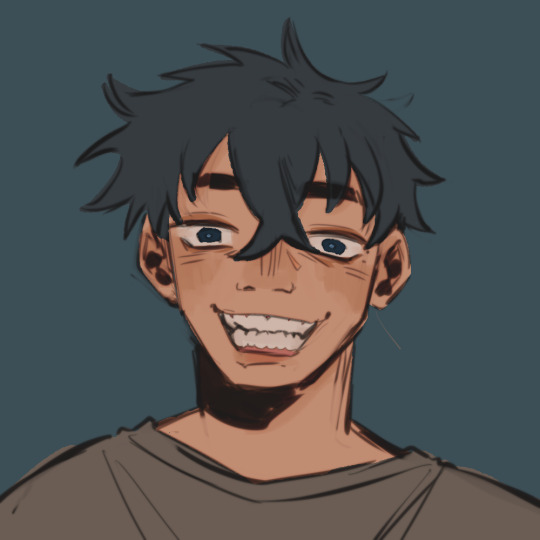
Ben Juarez (Freakverse)-- 29 y/o ☆ he/him ☆ gay
Ben realised his was gay pretty soon after hitting puberty, definitely sometime in middle school. His peers for sure picked up on some gay ass vibes from him and it definitely contributed to the bullying he suffered, but his antisocial, possibly autistic behaviour took precedent, especially since he didn't start messing around with guys until after high school. He definitely attributes all of his bullying to his weird behaviour though, leaving him without a complex around being gay which like... GOOD. idk what he would be like if he had to deal with that too. He's pretty low-key about being queer, though he probably has his pronouns and a rainbow flag in his bio (he likes the aesthetic of the blue gay man flag but associates it too much with teenagers).

David Langston (i'm so sorry babe i cannot remember the name)-- 24 y/o ☆ he/him ☆ bisexual, genderqueer
When he first came out, David's family was less receptive than they are now and he only ever came out as being bi-- discovering he was genderqueer definitely came sometime during college. He definitely struggled with his familys uneasy acceptance, but it was better than the bullying he suffered at school. He only felt truly comfortable once he got into college and people cared less about all of that. He's very open about it now and definitely has pronoun and flag pride pins on his bag. He also 100% would write opinion pieces and reports on the local queer scene.
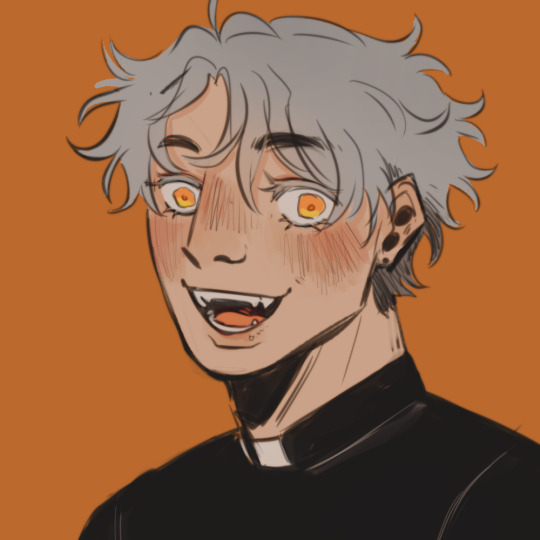
Ezekiel (Limbo?)-- adult ☆ he/him ☆ ???, trans man
Man i don't even know. He probably got the shit beaten out of him for his weird little ways regardless of if he was gay or not. He definitely doesn't feel bad about ANYTHING. he for sure thinks he was called to manhood by God and he definitely doesn't question his attraction to anyone, regardless of gender, because to him it's like. gods will or something. it's a good thing this freak was taken out of the dating pool -_-
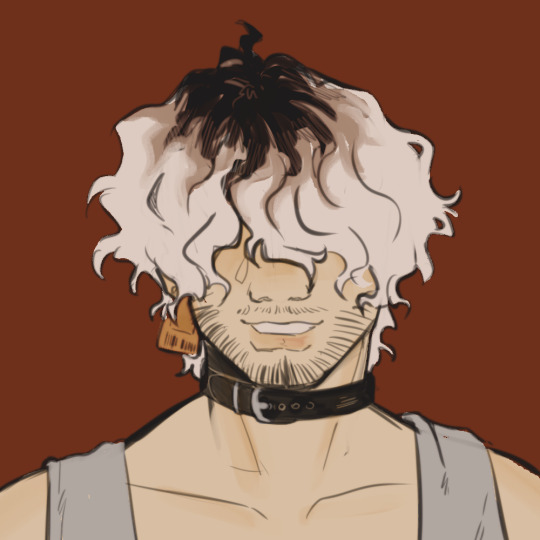
John Doe (Playing Doctor)-- 28 y/o ☆ he/they ☆ bisexual/queer, trans man
He don't remember what coming out was like. He just knows that he for sure did it, but canNOT for the life of him pull those memories to the forefront. He feels mostly neutral about being bisexual/queer, but he would be lying if he didn't feel a bit more guilty about being attracted to women specifically. He gets over it quickly and thinks about it only late at night. As for being trans.... isn't everyone? lol? In all seriousness, he cannot remember a time when he wasn't the man that he is now so it's not something he concerns himself with. He has bigger fish to fry and sicker women to annoy (who said that). He'd go to pride but only for the food (he is eating the floats).
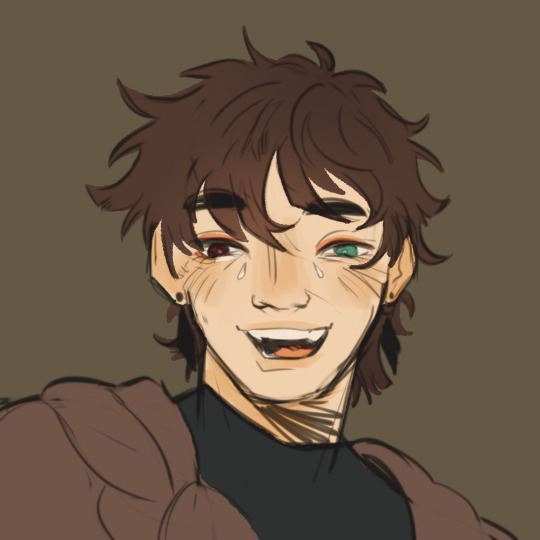
Juno (Juni and Me)-- 23 y/o ☆ she/they ☆ bisexual, genderqueer
Juno's first crush was 100% Juni which has irreparably altered how she interacts with those feelings of love and attraction and it does NOT get better. so unfortunately it's complicated <//3 bc like <//33 what <///3 this only grows when she meets Vee and experiences the horror that is the story of Juni and Me. Anyway that's the thing she agonises over most, she just accepts the fact that she likes more than one gender <//3 and the gender thing <//3 idk man is she even the person she thinks she is? she's so many people at once it just makes sense (she does not clue into this, she is blissfully unaware and just attributes it to a want to be free of common gender roles and expectations)

Odin Amarillo (Kingdom of Masks)-- adult ☆ they/he☆ queer, some sort of gender fuckery idk
Gonna be real I have a pittance of information for this guy I just didn't want them to feel left out womp womp. similar to Baldur, they don't rlly get to explore their sexuality or gender in any way that matters. they want to express themself more thru makeup but they have to wear a fuckass mask so they don't get mega-cursed (real and true threat for sure).
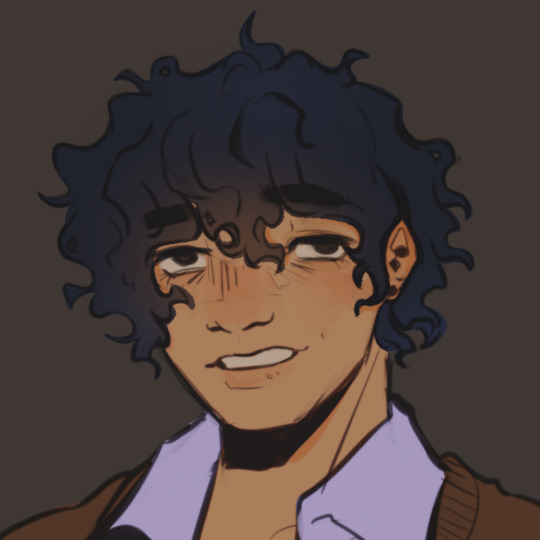
Seraphiel Killingsworth (Smiles dating simulator who said that)-- 24 y/o ☆ he/him ☆ gay
If internalised homophobia was a person. He willingly went to a pray the gay away camp and broke down when he realised he couldn't stop liking men and now he goes to church everyday to confess for the sin of liking men and now it's even worse bc he likes a demon and he has some fuck ass bitch pretending to be an angel calling him on random telephones talking about some random ass shit bro go away. He want to heal from all this hurt his upbringing and himself have brought upon him, but it's difficult to move past all these things which have cemented themself into his mind and who eh is as a person. He's certain he can if he just tries a little harder, but any reading of the Bible that doesn't end with him burning in Hell feels like a betrayal.
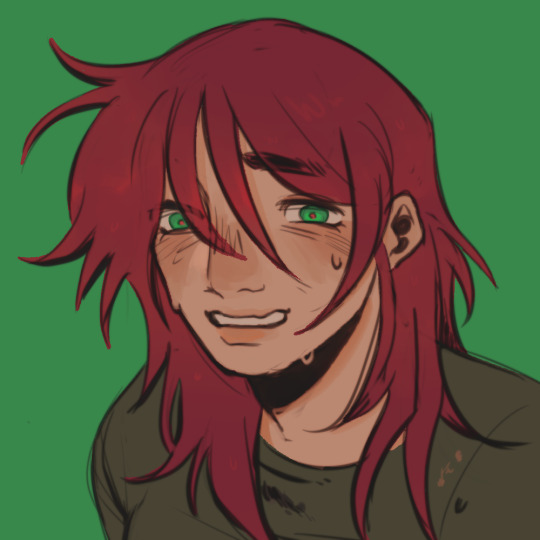
Wren Hawkins (Freakverse)-- 32 y/o ☆ she/her ☆ bi
She was 100% the weird girl that had other girls talking like "no she's like OBSESSED with me it's weird" and she definitely kept her eyes GLUED to the floor in the locker room because she was scared she was being predatory. She never officially came out to her family and probably never will, especially given the nature of her current relationship. She's least comfortable dating other women because she can't shake the fears of her past, which is unfortunate because she has a heavy preference for women. She will deny being queer, but she won't engage in homophobia unless it's against herself (womp womp)
#oc talk#oc:Aydin Wrong#oc:Baldur Solar#oc:Ben Juarez#oc:David Langston#oc:Ezekiel#oc:John Doe#oc:Juno#oc:Odin Amarillo#oc:Seraphiel Killingsworth#oc:Wren Hawkins#homophobia mention#just in case
1 note
·
View note
Text
ofpirouettes:
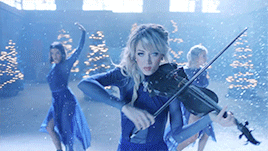
{lίттlє đяαġoи} ”And how is a dancer any different from a warrior? If you put a sword in my hands where a violin would be, you would revere me as a knight, a nimble swordswoman; a walking army.” Maliina pauses, taking in a breath and letting a smile touch her lips. Dancers never got enough credit. They danced until their feet bled and bent in the most horrid ways, and yet people only ever referred to them as weak, as fragile. Oh, she was going to rant. “Dancers are swift, our feet sure and our minds sharp. A smile for the crowd, or perhaps a sorrowful look to further the plot of a ballet. And have you seen pointe shoes? Fuckers hurt." The light pink rubber shoes squeezed into her feet helped her dance, like to spin around in the air, while balancing herself on the floor, yet they hurt, caused her toes to bleed. When walking from her rehearsal to her home, she had to ask for bandages for her feet, when needing to take her shoes off, to weigh herself on the scale for a nutrition appointment, as she had stomach issues ( having scars all across her body ) and worked a lot. Why is her feet bleeding, the questioning glance in her doctor spoke, as the back of her mind dreaded the silent judgement at home in her ballet studio. Will the bleeding stop, as she tried to explain the harassment of a lone dancer, who is perpetuated to be alone, yet her land is in violent uproar. All for a love of something dismissed as trivial.” Steel, crystal eyes glance over the caged bird again. Foolish, perhaps; does she think that she’s helpless? Maliina works her way backwards with the questions, like she does with the violin, swaying to and fro, gently gliding her hands through the delicate strings, feeling the twang and vibrato of the strings. She had danced through the snow in places like Dawnstar, playing intricate high and sweet and deadly tune. It was different to the ominous deep resonance of the cello, where it echoed hollow into her bones, trickled into the mahogany timber of her home. How did the Thu’um work? “Thu’um is strange. Some are active, like breathing fire or creating a burst of wind to speed you faster…. Some that summon spirits to fight with you..." She remembered, oh drakon e hup' anankes joor, joor, she repeats more harshly in growl against her throat, as the black dragon of yellow belly flew from the sky to land on the ground, it flapping its wings and breathing fire, gnashing teeth. Its claws were in the air, to lash out. Its heart was a vicious storm, a tempest. "And some that are more useful for messing with people than they are combat.”
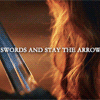
Maliina had a strong point here, it was all too true, that Sansa would regard her as a brave, gallant warrior, had a sword being wielded in battle instead of a seemingly harmless and harmonious instrument as a violin. “You have a point there…” “And I do not doubt your footwork, as it does seem to correlate to being a good dancer.” “I have seen pointe shoes before, yes, and have heard stories about them being uncomfortable.” She thought about becoming a dancer, as it was after all, a ladylike profession. She sucked a breath in, at Mal’s next words. There were so much magicks involved, in which yet the very idea of magic was not unique, the powers that came into play mentioned by Mal were. “These sound like incredibly powerful things to wield.” Summon spirits… Sansa then noted. She wondered whether Mal could resurrect her parents. “What kind of spirits? Anyone from the dead?”
0 notes
Text
No.vember. Im not doing NaNo this year. That was vaguely decided early on, and even if I had a moment of hesitation regarding Duke, about a month ago, in the end I stand by that decision.
I dabbled with Duke (and the B Brothers) in the first half of October. I cleared character baselines and made character sheets. And lemme tell you, there's a lot of characters in this story. The whole crew of The Scimitar.
The man characters are Folami Bolaji Brussards and Dominic "The Duke" Mitchell. Then there are Folami's (titlular B) Brothers: Enitan Bolaji Sinclair, Kayode Bolaji Muriano and Dayo Bolaji Brussard (Folami's twin). Then, there's mysterious Miss Lebeau, and five other crew members, who are also quite interesting. :) I kind of want to make their "faceclaims" or some other intro thing now, dang it...
Anyway. I learned a lot about them, and some character beats will make for interesting plot-points. The detailed plotline still needs some work, as does the spreadsheet, so I don't really have enough to tackle a pre-draft.
I'm alse really thrilled about the worldbuilding for this story -- the four moons, circling around the giant planet Ahella, each with their own culture, taboos, even ways of reproduction.
For example Leine women live very long, like three to five hundreds of years and can only get pregnant once every seven to ten years. Their males live the earthly-human span, so it's only natural that children don't have the same fathers (Bolaji is the mother's family name, and the last names of Folami and her brothers are the names they got from their fathers). Oh, and females are born rarely.
Interesting thing -- because Folami was in the womb with a male, her twin, something got "broken" in her and so far, even though she's over thirty now, she hasn't yet had her first fertility period. Perhaps she never will? That is taboo on her world. And because her mother had twins, all of her brothers are considered risky and no Leine females want to have their children.
Saegi -- that's Dominic -- only have nineteen fertile men on their moon, as most males are born with some sort of defect (due to the fact that their moon, Sharassa, is the closest to Ahella and the planet has strong magnetic fields that damage DNA). I'm not saying females aren't, mind you, but that's a cultural thing, that males were elliminated from the gene-pool because of that (yes, it is eugenics).
Hogan people have three "genders" -- male, true female and surrogate. Females and males produce gametes, but fertilization and pregnancy occurs in the body of the surrogate. No one really knows whether original females lost the ability to get pregnant, or whether they lost the ability to produce gametes, but now the surrogates are considered "incomplete" and they can't raise children. Miss Lebeau was a surrogate and she gave birth to over twenty children during her lifespan. Now she's older, but because she's always been smart and cunning, she is rich, at least.
And then, there are mysterious Poreen, from the moon farthest from Ahella and distanced not only by space, but also because they are very reclusive. Turns out all of them are hermafrodites -- capable of begeting a child, as well as carrying a child begeted by another.
The Scimitar crew are mostly Leine, but there are two Hogan (Miss Lebeau comes in later on), one Saegi (Dominic) and one Poreen, Ochra, Enitan's lover.
Parenthood (or inability to be a parent rather) and sexuality aren't the most important themes of this story, but they certainly play a part. There is a mystery how those people even evolved on the moons? What is their true history? Aren't they destined for extinction due to all the fertility problems?
Beside that big picture theme, there's also love, blood and found family and other shenanigans.
#.
Well. The other half of October I spent on rewriting Ananke. On cutting it, actually, because I want to get its 40k below 20k. That's the maximum number that's accepted by science-fiction magazines for publishing and I lost hope that a 40k novel (novella) will find a buyer. It's too short and I don't have enough passion for it to make it longer, or inspiration to write that other potential 40k story that could be Ananke's companion. I think I'm gonna keep cutting for a week or two (or three) more.
#.
I wanted to figure out which of the other big projects I'd want to tackle next, too, but considering that Ananke is still on my plate, I think I'll get to it another time. In two (or three) weeks, probably.
1 note
·
View note
Text
Okay I’m a Classics major (with a focus in Ancient Greece) so I’m going to look at some of the Greek mythology and history.
Many of us already attribute the three mothers with the three fates as you have described. (I’m very excited that there might be a connection to Moriai)
The red “lasers” that the three had with those spheres instantly reminded me of the threads of life controlled by the fates as well.

Especially when they have Sabine trapped and are controlling her movements. It even looks like the string is going through her.

but they also have a connection to the cyclical nature of the universe.
In Plato’s Republic, the Moirai are suggested to be the daughter of Ananke. Ananke was the primordial deity of inevitability or necessity. The Fates symbolize both the necessity of birth, life, and death, but also the inevitability of fate, and the events destined to occur in a human’s life.
“This is the word of Lachesis, the maiden daughter of Ananke (Necessity), souls that live for a day, now is the beginning of another cycle of mortal generation where birth is the beacon of death.”
(Plato, Republic 617c)
—
The cycle of the universe is a theory that Baylan Skoll brings up to Shin to explain his motives is also something I’m interested in.
“As you get older. Look at history. You realize it’s all inevitable.”
“It repeats again, and again, and again.”

Many different parts of the world ascribe to this theory in one way or another.
Okay so what does this actually mean with Baylan? Well looking at the rise and fall of empires is where I immediately see his ideas.
I am only really familiar, again, with the Ancient Greek history and some other ancient Mediterranean events . Specifically the historians Herodotus and Thucydides and their explanations for the fall of Persia and Athens.
They both have a thesis in their histories that the reason for the fall of these great empires was due to the nature of power and the eventual corruption of said power.
The Persians were one of the largest empire of its time but famously the very small army of Greeks beat them.
Athens fell to Sparta after the famed “Athenian Empire” was following the same actions of the Persian king with regards to their rule.
I think one important thing to bring up is a part later in the episode where he brings up the Jedi. He misses “The idea of it” but he knew “there was no future there” due to the weaknesses and issues that eventually developed.
—
In general terms I think the motives Filoni is giving Baylan can be summed up by one famous quote:
“History often repeats itself”
So Baylan’s line “What I seek is a beginning. So I can finally bring this cycle to an end.” Is definitely following this same path.
I’m definitely curious to how this is going to play out. I have NO CLUE what might happen!




I also thought this was kind of fun (Jedi temple burning next to art of ancient empires burning)
Ahsoka Episode 6 “Far, Far Away”: The Story, the Symbolism, and the Score
Episode 6 of Ahsoka begins with the sound of distant purrgil calls as Ahsoka and Huyang travel through hyperspace, crossing the void between galaxies. During their discussion of the tales Huyang used to tell the Jedi younglings there is no music.


I loved that Huyang said such an iconic line in this episode, reminding us that this is indeed a fairy tale, a children’s story.
The Title Card for Ahsoka appears, and then the episode title, “Far, far Away.”
We hear ominous music when Sabine is in the brig onboard the Eye of Sion. The window to her cell is shaped like an upside down triangle.
The sinister music continues during the scene with Baylan, Shin, and Morgan on the bridge. Morgan’s Theme (the Nightsister theme) is heard when the Eye of Sion exits hyperspace.
The line “Peridea is a graveyard” reminds us that this is indeed a “descent into the abyss” a stage of the hero’s journey which I have discussed on this blog before. Ominous music plays here.
The characters who are aligned with the dark side are on a quest for more power to dominate others. They have followed the Path to Peridea as a kind of path to perdition as I have mentioned in my previous metas. But Sabine, our heroine, is descending into the Underworld on a more noble quest. She hopes to find her beloved Ezra Bridger, echoing the story of Orpheus, the hero of Greek myth who descends into the Underworld to find his beloved Eurydice.
Morgan’s Theme continues when they board the shuttle and descend to the planet Peridea.
The landscape of J. R. R. Tolkien’s Middle-earth is suggested by the giant statues and the Nightsister fortress, which resembles an evil version of Minas Tirith.
The characters encounter three Nightsisters, analogous to the Three Fates of Greek mythology, the Moirai. (Note the similarities between this word and the name of Ahsoka’s owl, Morai, a creature I predict that we will be seeing again soon.)
The three Fates were the personification of destiny in Greek mythology. The three sisters were known as Clotho (the spinner), Lachesis (the alotter), and Atropos (the unturnable, a metaphor for death). The end credits for this episode name these three Nightsisters as Klothow, Lakesis, and Aktropaw, clearly indicating the intended symbolism of these three characters. As George Lucas said back in the late nineties, “Well, when I did Star Wars I consciously set about to recreate myths and the — and the classic mythological motifs. And I wanted to use those motifs to deal with issues that existed today.” (From billmoyers.com) Lucas’ apprentice, Dave Filoni, has learned this lesson from the master himself.
The music is quieter in this scene, with sounds of low vibrations being heard. Morgan’s Theme continues when Sabine is imprisoned by the Nightsisters’ three orbs, which held her bound within a triangle made of red cords of energy.
Outside of the fortress three wolf-like creatures howl as ominous music plays. Choral music suggesting the mysticism of the fallen Jedi Order is heard as Baylan speaks of Peridea being a realm of “dreams and madness” from old “children’s stories come to life.” Once again, the viewer is reminded that we are being told a fairy tale, a myth. The musical score subtly teases the listener with three notes from Ahsoka’s Ronin theme in this scene.
Sabine is imprisoned inside the Nightsister fortress as the Chimaera arrives with the sound of ominous metallic rumbling. Thrawn’s flagship Star Destroyer was named after the female fire-breathing monster in Greek mythology which was part lion, part goat, and part dragon.
I am no Freudian, but the Chimaera’s open docking bay hovering over the phallic tower of the Nightsister fortress seems to be the most overtly sexual symbolism I have seen in Star Wars in a long time. However, I’m not here to discuss that visual metaphor.

Organ music which anticipates but does not present Thrawn’s theme is heard as the Nighttroopers muster under Enoch’s command. These undead stormtroopers have cracked armor repaired with golden seams suggesting the Japanese art of kintsugi, as well as armor pieces bound with bands of red cloth. They are heard chanting “Thrawn! Thrawn!” as the Grand Admiral makes his dramatic entrance. For me this chant was reminiscent of how the orcs in Return of the King chanted “Grond! Grond!” when using their mighty battering ram against the walls of Minas Tirith. (You can do your own Freudian analysis of that scene. I’m not going there.) What was Grond?
“Grond, also known as the Wolf's Head, was a one hundred-foot long battering ram with a head in the shape of a ravening wolf, used in the arsenal of Sauron in the Third Age. Though named for Grond, Morgoth’s warhammer, it was created in the likeness of the Wolf of Angband, Carcharoth.”—from lotr.fandom.com
Creepy music accompanies the Nighttroopers as they transfer of cargo from the catacombs beneath the fortress. What is inside them? Dead Nightsisters, waiting to be revived my dark magic?
Thumps and low pitched sounds accompany Thrawn’s conversation with Baylan.
Thrawn speaks of Sabine’s desire to be reunited with her long-lost friend. (The word desire is a very intentional word choice, with the connotation that the connection between Sabine and Ezra has potential to be more than just friendship.)
Sabine: I’m sure he’s doing just fine.
Thrawn: You gambled the fate of your galaxy on that belief.
Sabine: You wouldn’t understand.
Thrawn: Perhaps not.
Evil does not understand love and loyalty. (See my previous post about the Path to Peridea.)
Enoch returns Sabine’s weapons to her, and she is provided with provisions and a wolf-like howler for a mount. He tells her to “die well” as she embarks on her “fool’s errand.”
The line about a “fool’s errand” calls to mind this scene from Tolkien’s novel, The Return of the King:
'Tell me,' he said, 'is there any hope? For Frodo, I mean; or at least mostly for Frodo.'
Gandalf put his hand on Pippin's head. 'There never was much hope,' he answered. 'Just a fool's hope, as I have been told…”
“A Fool’s Hope” was also the title of the penultimate episode of Star Wars Rebels final season.
Once again, Thrawn’s theme is only hinted at by the organ music at the end of the scene.
Sabine’s scanner is destroyed during her fight for her life with the red-armored bandits in the wastelands. Her life is saved by her Mandalorian armor and weapons, Ahsoka’s training, and Ezra’s lightsaber in this action sequence.
Baylan and Shin ride out on howlers. Nighttroopers load coffin-like cargo containers onto the Chimaera as uneasy music plays. Thrawn decides to dispatch only two squadrons of Nighttroopers. His disdain for Jedi, light or dark, is apparent: “It matters not whether Wren and Bridger are killed or stranded here. The same can be said for your two mercenaries.” Ominous music plays.
The scene with Sabine and the howler is accompanied by gentle music played upon wooden flutes. Sabine processes her abandonment issues and her complex feelings for Ezra in this scene by taking out her emotions on the howler. “You. You abandoned me. I should have known you are a coward.” She tries to make the howler stop following her, but the loyal animal comes back as soon as she walks away. “Okay. Fine,” she says. “I’ll give you another chance, but you better not bail on me this time.” The gentle flute music continues. A motif of ascending perfect fifths suggests Ezra’s Theme.
The howler stops to drink water and sniffs the air. The thing that Sabine and the audience assumes to be a rock is revealed to be a sentient little hermit-crab-like creature called a Noti. Gentle music plays when Sabine kneels, puts down her blaster, and extends her hand to the creature. The Noti recognizes the Rebel Alliance symbol (an evolution of her own Starbird design) on her pauldron. The creature has a medallion of his own, marked with a similar symbol.
“Do you know Ezra Bridger?” Sabine asks, touching her heart. “He’s my friend.”
Ominous music plays as Baylan and Shin discover the dead bandits. Once again choral music is heard when Baylan reminisces about the Jedi Order.
It is also revealed that the Nightsisters are fleeing from a power that is greater than their own.
Baylan and Shin see the red Bandits in the distance. “The enemy of our enemy is our friend,” says Baylan, “for now.”
Peaceful and noble sounding music is heard when Sabine sees the Noti encampment. She smiles at the mother Noti rocking her baby in a hammock.
With Sabine in the foreground, the camera pans to show a now adult, bearded Ezra Bridger wearing a red robe and leaning against the wall of his home. “I knew I could count on you,” he says as joyful music plays, music which features the piccolo, flute, and other woodwind instruments.
The closed captioning for this episode says that there is captivating music playing when Sabine and Ezra finally embrace. This is a beautifully orchestrated rendition of Ezra’s Theme on the French horn with a new counter melody in the strings to heighten the emotional impact of this long-awaited scene.


Ezra’s Theme is heard again when he says “Sabine, thanks for coming. I can’t wait to go home.”
When we return to where the Chimaera is docked with the Nightsister fortress, a suggestion of Thrawn’s Theme is heard at a quick tempo suggesting the urgency of the situation that is about to unfold. Ahsoka Tano is coming. “The thread of destiny demands it” is a line that further emphasizes the three Nightsisters playing the role of the three fates. We finally hear Thrawn’s Theme presented in an obvious way as the episode ends.
I have blogged about the magnificent end credits music in previous blog posts, so this time I am going to discuss something different: the alchemical symbolism in Ahsoka.
The central focus of alchemy was to transmute base metals into gold and create the elixir of life, as any aficionado of the lore of the philosopher’s stone knows. The process is a metaphor for the purification and transformation of the human soul to a state of perfection.
Three colors symbolize this process, black, white, and red.
First there is the nigredo (blackening) stage of the alchemist’s work, representing the breaking of the human spirit. This is where both Sabine and Ahsoka are at the beginning of the series.
Second is the albedo (whitening) stage, which involves washing away impurities or vices, and being ready to grow and learn again. This is most clearly illustrated by Ahsoka the Grey’s “death” and transformation into Ahsoka the White.
Third is the rubedo (reddening) stage, which is where we are in the story right now. It represents the purified and awakened spirit reaching its highest and purest form.
“The symbols used in alchemical writing and art to represent this red stage can include blood, a phoenix , a rose, a crowned king, or a figure wearing red clothes.”—Wikipedia.
The color red, of course, is symbolic of Nightsisters and their magic in this series, as well as symbolizing the red thread of fate.
Baylan Skoll’s line about having to “destroy in order to create” is an example of the alchemical concept of “solve et coagula” meaning to separate then join together. Nothing new can be built without destroying the old. Perhaps this is really telling us about the destruction and rebuilding of the Jedi Order.
In the completion of the rubedo stage there must be a union of sulphur and mercury, also known as the wedding of the Red King (the sun) and the White Queen (the moon). Sulphur represents the masculine principle, the soul, and the fire of life. (Remember Ezra’s red robe?) Mercury represents the feminine principle and the mind, flexible and changing. (Sabine is a clever young woman who lives inside her head, sometimes too much. Lately she’s been distracted by her heart.) Mercury also represents a state that can transcend death.
Is the much-discussed Ezra and Sabine hug the union of Sulphur and Mercury? Or should we expect something more than that?
Much has been written about Baylan Skoll and Shin Hati as the mythological wolves who chase the sun and the moon. This episode ends with the pair in pursuit of Ezra (sulphur, the Red King, the sun) and Sabine (mercury, the White Queen, the moon). When Skoll and Hati catch the sun and the moon, Ragnarok begins.
Besides sulphur and mercury, there is another element present at the rubedo stage of alchemical transformation: salt.
Ahsoka the White is coming.
Please reblog and comment on what you think of my musical and literary analysis of this episode of Ahsoka. I am looking forward to reading your replies.
#star wars#ahsoka spoilers#ahsoka show spoilers#ahsoka series#ahsoka#ahsoka show#star wars rebels#sabine wren#ezra bridger#ahsoka tano#star wars meta#ahsoka speculation#Ahsoka analysis
203 notes
·
View notes
Text
Call him a dog and he'll probably bark and wag his tail, lol
3 notes
·
View notes
Text
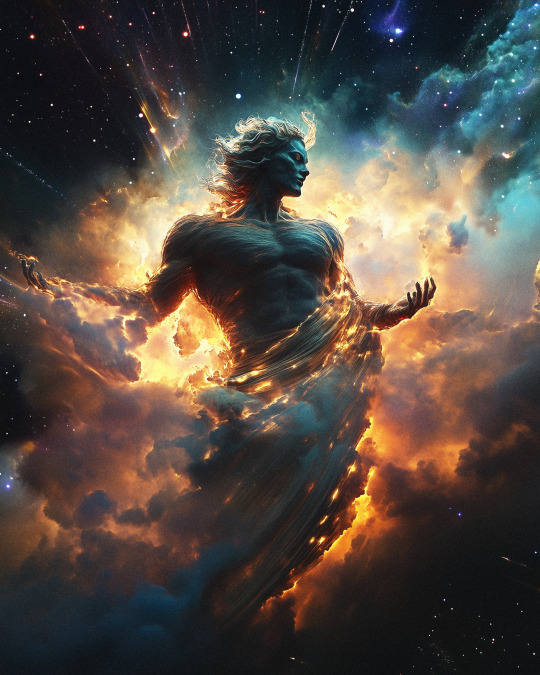
Phanes – The God of Creation And New Life Phanes is the god of proliferation and new life. He was hatched from the cosmic egg and created the world as it came to be. A dual deity of light and goodness, Phanes is a vague figure in Greek Mythology. His symbols are the egg, the serpent and the zodiac circle.Phanes’ OriginsBased on the Orphic Tradition, before the beginning of conscience and existence, Chronos (Time) created the cosmic egg, out of which emerged a deity with large golden wings on his back, wearing a helmet on his head and bearing an obscure serpent around his body.
His name was Phanes Protogonos (First-Born) and he was the first deity that brought light and shaped the world. Other sources regard him as more of an abstract personification of the universe rather than an actual god, placing Nyx, The Greek primordial Goddess of Night as the first deity that came into being.Roles and ResponsibilitiesPhanes’ primary role was to beget the world and make life. After the creation, he ruled over the cosmos and paved the way for the rest of the gods to come.PHANES was the primordial god (protogenos) of creation in the Orphic cosmogony. He was the generator of life--the driving force behind reproduction in the early cosmos. Phanes was hatched from the world-egg, a primordial mix of elements split into its constituent parts by Khronos (Chronos) (Time) and Ananke (Inevitability). art: Phanes by Mahaboka
6 notes
·
View notes
Text
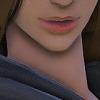
“People often claim that Fengári gets her craziness from me.” A slight cackle then escaped her. “As if they think I was not aware of that fact already.”
#CHRONICLES OF THE TRAVELER (Ananke ic)#DAYS OF OUR YEARS GONE (presundered verse)#((brief escape from depresso for... craziness?))#((Idk I was just inspired to make this kjdhgkdf))#((But yeah I think I will save some info regarding Ananke's demise for... another day :3))
0 notes
Text
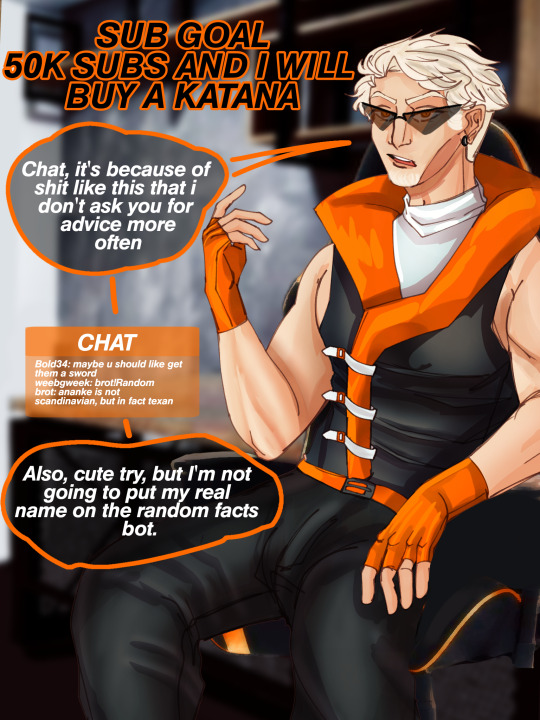
Streamer BrOC from @truculentthespian 's fic, jumpstart my heart and wake the sleeper inside (whose title i have just now realized is a pun om the heart aspect). Since the actual streaming hasn't happened, I mostly did this basing on headcanons, such as BrOC's username being Ananke (which is one of the concepts in plato's Timaeus dialogue, namely of inevitability and necessity... Both of which Bro has to in regarding to paying his bills lol) and BrOC still having a few chatbots, even if more common ones.
#homestuck#my art#bro strider#why i was in anon u ask#because tumblr doesnt let people send asks from sideblogs thats why#also an odd amount of techwear that isnt 50 layers has essentially manly sideboobs? idk why im just going where pinterest commands me
109 notes
·
View notes
Text
brainstorming hcs about my version of new agent 3 while I listen in on this zoom meeting for work, here's what I thought of so far :
• they were 100% that kid in kindergarten who would eat glue/random stuff off the ground
• so the first time they see little buddy eat the ooze they go "no fair I wanna try it too"
• and now as a result they have some of the ink color seen on the fuzzy ooze at around the ends of their tentacles and a barely noticeable ring around their eyes
• calls capt. 3 things like "dad" or "mom" or "parental unit" ironically, becomes unironic later the more ananke mother hens both them and little buddy
• found little buddy as an egg and genuinely regards him as one of their own
That's all I think of so far for now so back to work I go 😞
8 notes
·
View notes
Note
🧢 Childhood.
Virgil had an abbreviated childhood. He was born into a family who worshipped an old god. His parents tried to drown him in much the same way he drowned his little brother: they wanted to see if he would be saved. And he was. He survived the attempted drowning, and from then on, he was regarded a vassal alongside his mother. Ananke followed him wherever he went from then on. It used to frighten him, seeing the god in the water wherever he went. But he quickly got used to it.
2 notes
·
View notes
Text
The satisfaction that comes from external hyperfixation, when it’s met, is a great feeling. It’s a shot of dopamine or whatever, that can fuel you for... well, for hours, in my case. The validation. I crave it, I can’t say that I don’t.
What I do not like about hyperfixations, is that this feeling of fulfillment doesn’t last. And when it fades, the craving is very disturbing and disruptive. But also, it is very difficult to deny myself the possibility. The ‘maybe next time it will be more validating, maybe it will last longer’. Well, it’s external, so there’s no guarantee.
This is why, for a while now, I steer away from hyperfixations.
And also, there were external hyperfixations in which, in the end, I was downright humiliated for my hopes and beliefs. Brutally. And I’m scared to ever feel that way again.
I hope I am at a point where I can separate from my recent hyperfixation, but do it in a friendly manner, so to speak. I am not disappointed, this time around. I mean, I didn’t get the validation today, but I got quite a lot from this thing earlier and most importantly, I wasn’t slapped in the face for my expectations. I wasn’t told -- your ideas and your point of view is stupid. I know I have things to look forward here, in the future. I just don’t want to feel so strongly about it.
#
Internal fixations are not hyper, they are calmer in nature, but provide comfort that comes from stability. That’s what original writing is for me. I really, trully, want to fixate on that. I’ve been aiming to get to this point for a couple of months now, despite the pull of hyperfixation. I have to use the fact that today that pull weakened a little bit and let it go completely.
The problem, I think, is in the fact that the characters from Ananke are not nested in my mind strongly enough to counter the pull of hyperfixation. Crystal Spring characters might. Or The Specters’ ones.
Okay. I’ll see about that Crystal Spring thing, but first I have to clear my slate with regards to money-paying work. I’m glad I managed to put my jumbled thoughts into words though. Thank you for reading. ;)
#life of tes#hyperfixation#kc#i kind of wish i had someone#who would get it#or rather#someone to whom i wouldn't be afraid to open up#that would be validating too#but i am too scared#which is why#talking to the void#feels safe#:)
5 notes
·
View notes
Text
Trouble Earth-Born
(A/N: This fic is about the birth of Erikhthonios, one of the legendary kings of Athens. Contains mention of past attempted rape and attempt of indirect murder and insanity)
.
Athena wasn't quite sure of what to think, as out of nowhere a Protogenos manifested in front of her as a middle-aged woman holding a baby in her arms.
“Venerated Foremother”, she greeted the person in front of her.
“Daughter of Zeus and Metis”, the other returned.
To a mortal she would have seemed like your average chubby matron. But she radiated such raw and incomprehensible power, such cosmic and primeval might, that to a goddess like Athena there was no doubt, who she was.
Gaia, the Earth Mother.
The generous and the terrible.
The nurturing and the destructive.
The mother of the sky, the sea, the mountains, islands and the fair spirits of nature, also of the Titanes, the Hekatonkheires, the Elder Kyklopes … and the monstrous Typhon.
“What gives me the honour?”, Athena questioned the Protogenos.
The dubious honour. That she didn't say.
Gaia held out the baby she had been holding. “This is yours now.”
Athena's bright blue eyes grew to the size of saucers. “I beg your pardon?!”
“Do you remember that little non-consensual almost-tryst you had with the blacksmith god?”
Athena frowned. “As if a woman could forget something like that.”
“And do you remember, how you threw the cloth, which was soiled with his seed, onto the ground?”
“Oh … oh, holy shit, did I accidentally knock you up?! I'm so sorry!”
“I'm Mother Earth”, Gaia pointed out. “Do you have the faintest idea just how many children I have? I mothered half of the Kosmos, Ouranos included! That fucking arsehole”, she added, muttering. “Either way, this happens all the time. I'm used to it and I can't even say, that I mind. However, this baby here has a little of your essence within him. So congratulations, Pallas Athena, head-born daughter of Zeus – you are now a virgin mother.”
And before the goddess could protest, the Protogenos pressed the child into her arms.
Then Gaia sank into the ground and once more became one with … well, herself. Leaving a very flabbergasted Athena holding a godsdamn baby.
“Sooo …”, Athena sighed and regarded the child. It was a boy and he had jet black hair and big brown eyes, just like his father – but despite him being a baby, she could tell he had her aristocratic nose and her high cheekbones. “I guess you are my son now, huh?”
Whelp.
She might have been the goddess of knowledge and good counsel, but she was also a virgin goddess; she had no idea how to do this kind of stuff! This was something for … pretty much any other of the Olympians.
Oh well … she would just have to take responsibility and try to raise this child. After all, it wasn't his fault, that he had been conceived like that and there was no way she would approach the god, who had tried to rape her in his drunk delirium.
Somehow this troubling memory gave her the idea for a suitable name for the earth-born baby.
The baby cooed and stretched out his chubby little arms. Okay, that was cute.
Athena smiled: “Well, I suppose I will have to raise you in secret, so no one can find and tell the world about a virgin goddess having a child.”
And with the child in her arms, she flew away and off to her new city, the one that now bore her name: Athens.
.
“You want us to take care of this chest, Potnia¹?”, Pandrosos asked.
Athena, who was holding a small chest in her arms, confirmed: “That's right. I want you to take this wooden chest here to the chamber behind my altar and watch over it, until I come back in a few days. You don't have to do much, but always remember this: Do. Not. Open. This. Chest. Is that clear?”
“Yes, Glaukopis²”, the three daughters of Kekrops, king of Athens, replied in unison.
The bright-eyed goddess nodded: “Good. Now I need to tend to my other duties. See you in a few days. And I warn you, if I find out that you disobeyed my order to not look inside this chest, you will suffer a fate worse than death. Keep that in mind. Toodles!”
Then she returned to Olympos, before anyone there would question her absence.
.
A few days later, Athena was carrying a whole-ass mountain across Attica (how? Goddess strength, that's how!) for the Akropolis, when a crow joined her in flight.
“Oh, hello, Koronis!”, the goddess greeted the bird.
“Hello!”, the crow replied. “I'm sad to say, that I come with bad news.”
Athena stopped short. “What happened?”
“Well, you asked me to keep an eye on the Kekropides, if they would do as you told them, right? They didn't.”
Promptly the goddess dropped the mountain.
“They opened the chest”, she said blankly.
“Yes, but only Aglauros and Herse. Pandrosos doesn't know. I'm so sorry!”, the crow cried, “I tried to talk them out of it, but they wouldn't listen!”
“It's not your fault, Koronis!”, Athena hissed, suddenly seized by wrath. “Oh, when I get my hands on those little bitches, they're going to get it! As for you, don't tell anyone of what you have seen, do you hear me?”
“My lips- I mean, my beak is sealed.”
“Good.”³
The wrathful goddess teleported herself to her temple in Athens, where she found Herse and Aglauros screaming hysterically on the floor.
With measured steps, Athena approached the chest. In it lay a baby, obviously none other than her earth baby, who was crying softly. A snake was coiled around him protectively and hissing aggressively, though it calmed down as soon as it saw Athena. The baby's upper body was normal, but from the hip downwards, his body was that of a serpent. As soon as he saw his adoptive mother, he stopped crying, bubbled happily and lifted his tiny arms.
“Hello, sweetie”, Athena cooed, completely ignoring the hysterical screaming behind herself. “Sorry for being away so long. But now I'm back.”
She picked him up and cradled him in her arms and he fell asleep in no time, while she was crying on the inside and desperately prayed to Khaos, Ananke and the Moirai, that she would be spared the shame of having to explain, why she was raising a child.
With blazing eyes and fury in her heart the war goddess turned to the mortal women, who were still having a mental breakdown on the floor.
And with a mighty, divine voice, she bellowed: “Go to the cliff behind my temple … and jump!”
The women, completely out of their minds, scrambled to blindly follow the goddess's order.
Athena followed them. She craved the satisfaction of seeing the ones who had dared to cross her fall to their deaths.
Imagine her surprise, when they jumped and she saw two flashes (one bronze, the other crimson) descend from the sky – and a second later, the two madwomen were caught in their fall.
“Hermes! Ares!”, Athena exclaimed.
“Hi, Athena!”, Hermes chirped, while struggling with a raving Herse in his arms.
“What's the meanin' of this?”, Ares demanded to know, as he was holding Aglauros in a vice-like grip (for a second Athena marvelled at his impressive pair of crimson wings, which he was beating to keep his stability against the wind and his struggling, screaming captive). “Why'd ya drive these two insane and make 'em jump off the Akropolis?”
Hermes nodded. “Yeah, we'd like an explanation. For that and for why you're holding a baby in your arms.”
Oh shit. She was still holding the little one in her arms and now her two half-brothers had seen him! Ares hated her and would be all too happy to rat her out, while Hermes was a notorious chatter box.
By Ananke, this really wasn't her day.
Athena forced herself to calm down and step back, so the two could land.
“Come inside my temple”, she sighed. “And I'll explain everything. And while we're at it, you could tell me, what you're doing here and why their worthless lives matter to you enough to save them.”
With a scowl she pointed at Aglauros and Herse, who were still winding themselves in the gods' arms.
“It's a deal”, Hermes accommodated her and he and Ares landed carefully.
“But first we gotta restrain these two”, Ares stated. “They're gonna hurt themselves otherwise.”
.
“So, lemme get that straight”, Ares said, as he nibbled at his ambrosia. “My brother Heph tried to assault ya, while he was drunk. You kicked his arse, because obviously. Then some of his cum got on your thigh, you wiped it off and threw it away, also because obviously. And then Gaia thought it would be hilarious to turn this soiled cloth into a baby and push it onto you, even though she knows, that you have sworn to remain virginal and childless forever.”
Athena nodded.
The older god scowled: “Yeah, that sounds like something that fucking arsehole Protogenos would do.”
The wisdom goddess almost chortled at that.
“And then”, Hermes jumped back to the original topic, “you put him in a box, asked the daughters of Kekrops to take care of the box and not open it. But they opened it anyway and went cuckoo. And you were mad at their disobedience, so you told them to jump off the Akropolis.”
“Correct”, Athena confirmed. Then her face darkened again. “And now it's your turn. How are you related to those two? Don't tell me you've slept with my servants!”
It was Ares, who answered: “Slept with them – no. Courted them – yeah.”
“Good”, Athena nodded. “Only virgins like myself are allowed to serve me.”
“Speaking of the two”, Hermes piped up, “can you please give them their sanity back?”
The warrior goddess's eyes narrowed. “Why? They had it coming! That's what you get for snooping and disobeying my orders.”
“Pleeeease”, Hermes begged. “We'll carry them far away from Athens and you'll never have to deal with them again! How are we supposed to get lucky with them, if they're insane?”
“Get yourself mistresses that aren't deal-breaking bitches?”, Athena deadpanned.
In that moment the baby kicked in his wrappings and began to whine. She sighed and picked him up.
“I was going to give him nectar and ambrosia, once he became immortal, because that's what I was planning to do. But now that he's mortal like any other human, I don't know what to do!”, the goddess lamented. “I'm the goddess of wisdom, but I'm also a virgin and I can't handle babies for crap!”
Ares frowned: “Yeah, that much is clear. Well, Daddy's Owl, how 'bout ya take some advice from an actual parent, who's got experience in bringin' up kids. First off: you're holdin' him all wrong. Do ya think the baby can hold its big head up by itself?”
Athena cringed and hurried to rearrange her hold.
But the war god just shook his head, came over and guided her arms to show her how to do it right, until she managed to do it to his satisfaction.
“Better. Secondly: he's hungry. He needs mother's milk. I suggest ya find him a nurse, 'cuz the way I see it, you're not the kinda woman to breastfeed a baby.”
“Right!”, Athena huffed. “You two don't happen to know someone, who won't go insane at the sight of him and his snake guardian and who can keep her mouth shut?”
“I could ask my mother”, Hermes proposed, albeit reluctantly. “She is silent, a recluse and has adamantine nerves. And once the nursing period is over, she'll just give him back to you.”
Athena thought for a moment, ere she consented.
“Alright, thank you. Now that this is settled, there is one more thing I have to ask of you, before I cure these two women of their insanity and let you take them away.”
“Whatever ya want”, Ares promised. “If it's in our power, we'll do it.”
Hermes nodded affirmatively.
Athena's face became stern. “I demand the most sacred oath. Ares. Hermes. Swear to me by Gaia, Ouranos and the freezing water that drips from Styx, that you will never tell anyone about this child. And Hermes, I want you to let Maia know, that I expect the same from her.”
The two gods didn't hesitate to swear this solemn oath.
The goddess of wisdom sighed: “I still don't understand what you see in those two. But whatever. A promise is a promise.”
She snapped her finger and the two mortal girls passed out. Really, the things she did for her family!
“There. When they wake up, they'll be sane again. I suppose this is your lucky day, because these two are so fired from my service! So, if they consent to it, couple with them as much as you want. I literally don't care what you do to them, as long as it isn't rape.”
“Of course not. Thank you, Athena”, Hermes smiled politely.
“One more thing!”, Ares requested. “Before we proceed any further, can I hold my nephew?”
Athena tilted her head. “Huh? Uhm, sure.”
With great care the god of terrible war took the baby from his half-sister's arms.
The infant didn't seem frightened of Ares at all, quite the contrary: it giggled and coiled its serpentine lower body around his wrist, when he made silly faces.
“Awww, you're such a big softie! I wish I had a camera!”, Hermes teased.
Athena smirked: “Yes, I never thought I would see that day! Look at that, the little one really likes you!”
“Don't make me stuff you two into the next best volute krater⁴”, Ares warned without turning his gaze from the little one. “I'm sure, I can find one big enough for you both.”
The other two chuckled, but ceased their teasing; they couldn't fight with a baby in the room.
Hermes addressed Athena: “By the way, what's the little one's name? You gave him one, right?”
“But of course”, she confirmed. “His name is Erikhthonios.”
.
---
.
1) Potnia - "Lady/Queen/Mistress" 2) Glaukopis - "Bright-eyed/Owl-eyed", an epithet of Athena referring to her bright eyes (which depending on the translation are either grey or blue). 3) In some accounts Athena punishes the crow - which up to that point is her familiar - for either telling the girls what was in the chest or for being an overzealous tell-tale, by turning its feathers black, giving it a croaking voice and banishing it from her company. That doesn't really make sense to me, so I didn't include that version. 4) Volute krater - a big ancient Greek jar, used for wine.
#Greek Mythology#Gaia#Pallas Athena#erichthonius#Hermes#ares#herse#aglauros#a crow#give milk to the half-snake baby#athena is no good at parenting#but she tries okay
13 notes
·
View notes